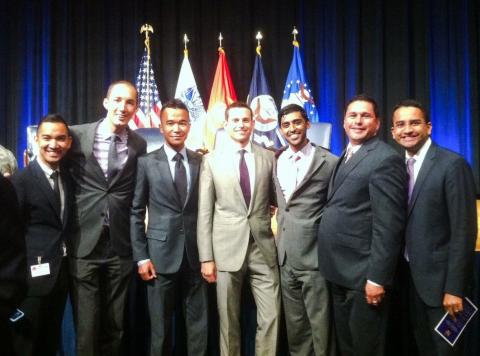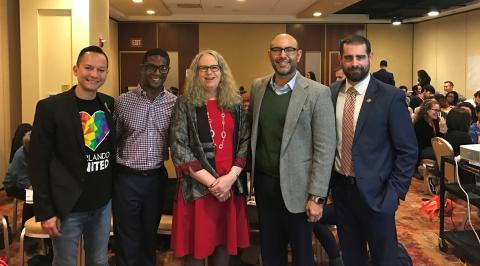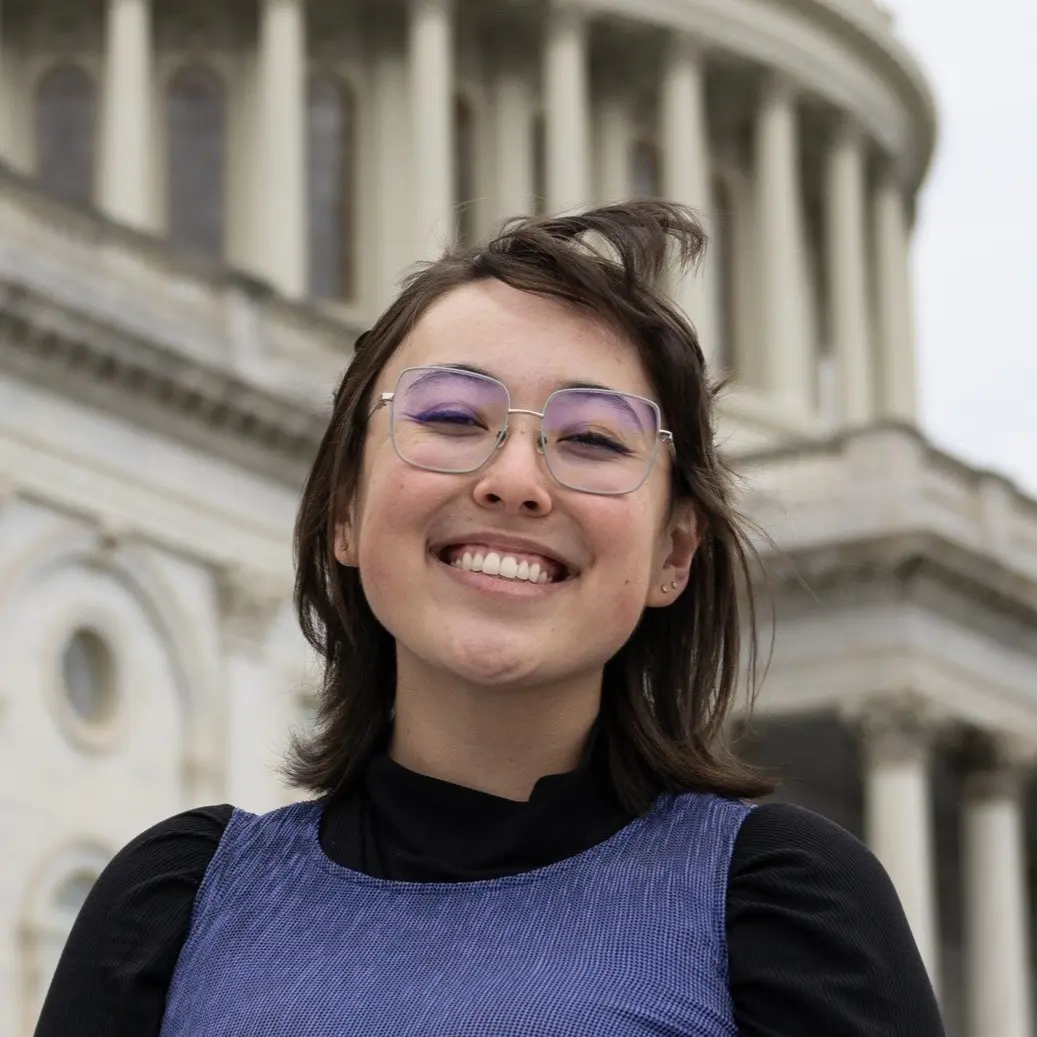
President Barack Obama appointed over 300 LGBTQ people to positions throughout his administration during his time in office – an achievement that made it possible for LGBTQ interests and voices to be at key decision-making tables across the federal government for the first time in our nation’s history. From health care and housing to civil rights and military inclusion, the Obama administration made several historic strides in the march for full equality for LGBTQ Americans.
Among those who were appointed in the early days of the Obama presidency was Alex Wagner, who up until January 20 of this year was Chief of Staff to United States Army Secretary Eric Fanning. Nominated by President Obama in 2015 and confirmed by the U.S. Senate in 2016, Secretary Fanning served as the first openly gay secretary of any branch of the U.S. armed forces.
Days after President Obama left office, Victory Institute sat down with Alex and spoke to him about the values that have driven his life’s work and passion. In a wide-ranging interview, Alex spoke about his journey from then-Senator Obama’s 2008 presidential campaign to the Department of Defense as well as the progress the Obama administration made for the LGBTQ community along the way. He also imparted some advice to openly LGBTQ people considering a career in the Army or any branch of the military.
Read Victory Institute’s interview with Alex Wagner below.
Victory: What was it like serving as Chief of Staff to the first openly gay Secretary of the Army?
AW: I had really got to know Eric Fanning when he was (temporarily) the Department of Defense White House Liaison in the first few months of the Obama administration–he actually onboarded me my first day in the Pentagon. Over the next few years, we became friends and neighbors in addition to colleagues. Working alongside him in the building, I saw firsthand how respected he was, not only for being open about who he was, but for excelling at every new job and challenge he was asked to take on. When he was nominated as Army Secretary and asked me to be his Chief of Staff, I think I blurted out, “you don’t want me, I don’t know anything about the Army.” But he said he didn’t need me to be an expert; rather, he was looking for a disrupter: essentially someone who knew the building well enough to credibly question everything, not take “no” for an answer, and — most importantly — create decision space for him. That turned to be the perfect job description for me.
During his tenure as Secretary, we parlayed the “historic” nature of his appointment into a mandate to do things differently. He was able to tell the Army story to people and places in the country that the Army couldn’t reach previously, whether it be swearing-in new recruits in Harlem or on the field at Padres Stadium. He was likely the first senior DoD official to make liberal use of animated GIFs on Twitter and definitely the first to have a Snapchat account. He wanted to exploit new media platforms like podcasts, flying across the country to be interviewed on The West Wing Weekly in Los Angeles and on “Here’s the Thing” by Alec Baldwin in New York City. Of course, the most fun experience was when he was Grand Marshall of the San Diego Pride Parade, a city with a large military presence, sitting in a convertible waving to cheering onlookers. My biggest concern was not that the Secretary of the Army was in a pride parade; rather, I knew San Diego was Navy territory, so I wasn’t sure how he’d be received!
The mandate to “boldly go where no Army Secretary had gone before” also extended to issues related to technology, which I had an affinity for from my previous roles in the Pentagon and at Uber. Last year, Secretary Fanning announced he was offering cash prizes to those who could “Hack the Army,” challenging hackers to bring it on and exploit vulnerabilities in Army networks to help make them more secure. We also launched an Army Digital Service that will bring in Silicon Valley’s top software engineering talent to work on software solutions to enable the Army’s technology operate closer to private sector speed.
Victory: Along with Secretary Fanning, Air Force General Counsel Gordon Tanner, Deputy Assistant Secretary Amanda Simpson, and others, your presence at the Pentagon was historic too. How would you describe your tenure at the Pentagon, and what moment do you consider to be your proudest?
AW: It’s really incredible how effortlessly the Department responded after the repeal of “Don’t Ask, Don’t Tell,” which was still the law of the land when I arrived in 2009. There’s an old adage that “people are policy,” and there’s no question that President Obama made it real at DoD. I was so thrilled when I realized that former out Obama-campaign staffers were leading DoD’s comprehensive DADT review working group from the inside. After repeal, I teamed up with my friend Tarak Shah whom I had also met in Chicago in 2008, to push for the first DoD Pride event. We spent months gently guiding a working group to our desired end state, learning internal diplomacy and DoD politics along the way. It wasn’t easy and we encountered resistance throughout the process–even from some Obama appointees who thought it risky–but my proudest moment was exchanging hugs with my fellow Obama campaign friends, now administration appointees, in the Pentagon auditorium after that first Pride ceremony. I was worried no one would show up, but not only was the largest room in the building standing room only, but some were even forced to watch it on overflow TVs in the hallway.
Victory: The Obama administration made several historic advances for LGBTQ Americans serving in the U.S. Armed Forces. Having had close proximity to our men and women in uniform, can you describe the reaction from service members when Don’t Ask, Don’t Tell was repealed?
AW: Remember, DADT wasn’t repealed overnight (or by executive order as many in our community demanded). The process began with the President’s State of the Union in 2010 and throughout the course of the year, the Department methodically studied how to proceed with implementation of repeal, assuming Congress would act. Even after the President signed the legislation that December, it still required a lengthy “certification” period. So, it wasn’t until September of 2011 that repeal actually occurred and by then, I think everyone in the Department had already accepted it as a fait accompli. Perhaps the most surprising reaction was the day following certification, the Marine Corps — which had been the service most concerned about repeal — sent recruiters to an LGBTQ center in Tulsa, OK. I remember laughing when I read news reports that Marines were determined to prove that they will be better than the Army, Navy, Air Force and Coast Guard in recruiting potential LGB prospects.
Victory: Are you hopeful that efforts taken to advance LGBTQ equality in the Army – and elsewhere – will remain?
AW: You bet I am. For one thing, the culture has changed dramatically over the course of the eight years of the Obama presidency. In 2011, I started teaching LGBTQ rights at Georgetown Law, a few weeks after DADT repeal and just over a year after the President signed into law the Hate Crime Prevention Act, named in part after Matthew Shepard. Those were monumental legislative victories at the time, particularly after our community had been used as scapegoats for eight years of the George W. Bush administration. But if you told me that after eight years there would be 300 openly LGBTQ appointees in nearly every federal agency, LGBTQ Pride Month celebrations at military bases from Kandahar to Kansas, the Defense of Marriage Act invalidated as unconstitutional, marriage equality in every state, and an openly gay Secretary of the Army, I would have been incredulous. And with respect to the staying power of the advances over the last eight years in the Army and DoD more broadly, as my former boss likes to say: “It’s a lot harder to prevent someone from putting on a uniform than it is to ask a commander to tell one of his or her Soldiers to take it off.” I feel pretty good that nearly all of this process is here to stay because the uniformed military leadership was brought in to the decision-making process and, thus, has bought in.
Victory: How did your background prepare you for service in the Obama administration?
AW: I’ve never been able to stick to doing one thing for very long, which I think helped shape my outlook as a political appointee: I never wanted to get too comfortable doing the same job. I started my career as a reporter for a nuclear arms control journal, went to law school to focus on international law, and ended up as an intellectual property litigator in Seattle before joining the Obama campaign to work on LGBTQ rights policy and outreach. So my first appointment working to help implement the President’s nuclear nonproliferation “Prague Agenda,” was sort of a coming home for me. I then dusted off my legal training to work on detention policy and the law of war, before ending up at the United Nations (sometimes for weeks at a time) seeking to negotiate binding legal instruments that required balancing human rights with military necessity. In retrospect, it was only recently as Chief of Staff that I was able to bring all these various threads together to realize that success in advancing the President and Secretary’s priorities is less about having all the right answers, but rather, knowing where and when to ask the right questions. Being a successful appointee means using your networks and talents to get your boss information that the people who work for him don’t know and the people who work above him won’t share.
Victory: What guidance or advice would you give openly LGBTQ people who might be considering a career in the Army or any branch of the U.S. Armed Forces?
AW: This one is easy. Today’s military doesn’t care where you’re from, what you look like, or whom you love. If you can meet the very demanding requirements, both physical and mental, you’ll be accepted and valued. I’m reminded of a line from the DADT Comprehensive Review Working Group’s report, where one special forces operator was quoted as saying, “We have a gay guy [in the unit]. He’s big, he’s mean, and he kills lots of bad guys. No one cared that he was gay.” When Secretary Fanning and I visited one of the Army’s premier training facilities last year, we heard elite infantry Soldiers (a combat specialty that was previously closed to women) tell us how excited they were at the prospect of having one of the three female Ranger School graduates join their unit. If you’re smart, tough, and a leader, everyone is going to want you on their team–there’s no question in my mind.


